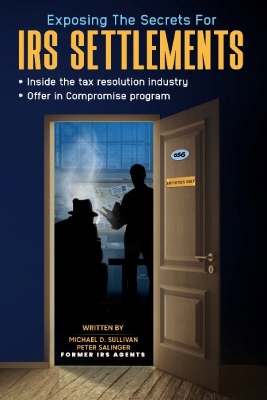Inside the IRS Seizure Unit: How Michael Sullivan’s Early Career Forged a Tax Resolution Powerhouse

Long before Michael Sullivan became a revered name in IRS tax resolution, he was a federal agent with a badge, a gun, and a mission to enforce the tax code. His early years with the Internal Revenue Service weren’t spent at a desk. Instead, they played out in the high-stakes world of asset seizures, narcotics investigations, and large-scale financial fraud.
Sullivan’s time with the IRS Seizure and Confiscation Unit offered a front-row seat to some of federal tax enforcement’s most complex and confrontational elements. While most tax professionals study case law, Sullivan lived it, carrying out property seizures, bank levies, and business padlocks, often alongside armed federal agents and law enforcement partners.
When Sullivan joined the IRS in the early 1970s, he quickly rose through the ranks of the enforcement division. Assigned to the elite Seizure Unit, he handled high-liability cases involving delinquent taxpayers who had evaded the system for years. These weren’t minor infractions. He was tasked with executing enforced collections, confiscating homes, shuttering businesses, and seizing assets when negotiations failed.
In one particularly dramatic case, Sullivan was sent to confiscate a mansion from a wealthy tax defaulter. Accompanied by U.S. Marshals and armed IRS agents, he executed the seizure while the homeowner begged for more time. “The law doesn’t wait forever,” Sullivan remarked, “especially when the taxpayer had years to comply.”
He recalls another instance when he padlocked a lucrative restaurant in Fort Lauderdale during the dinner rush. “People were still eating when I walked in with the seizure notice,” he said. “I told the waitstaff to collect tips, finish serving their tables, and walk out. We closed the doors that night and changed the locks.”
These encounters weren’t just acts of enforcement but learning opportunities. Sullivan gained firsthand knowledge of Title 26 of the Internal Revenue Code, tax lien priority, and due process rights. He developed a deep understanding of how IRS revenue officers interpret and apply rules under pressure, how cases are prioritized, and where most taxpayers (and their advisors) go wrong.

Sullivan’s years in the field didn’t just harden his resolve; they sharpened his strategy. His close familiarity with Form 668-A (Notice of Levy), Form 668-W (Wage Garnishment), and Form 668-B (Seizure of Property) laid the basis for what would later become his signature advantage as a tax resolution expert.
When he later transitioned into private practice, he used these tools not to punish but to protect. Understanding the IRS’s playbook meant he could anticipate their next move, often neutralizing aggressive enforcement actions before they escalated.
Sullivan’s enforcement career wasn’t limited to tax delinquencies. He worked hand-in-hand with agencies like the DEA, FBI, and Customs Enforcement, building cases involving money laundering, drug trafficking, and underground banking networks. These high-profile joint operations gave him insight into financial forensics, skills that still serve him today when handling complex audits and unreported income investigations.
His exposure to Title 31 (anti-money laundering provisions), CTR (Currency Transaction Reports), and SAR (Suspicious Activity Reports) compliance set him apart from traditional tax practitioners. Today, he’s one of the few tax professionals who can cater to both civil and criminal components of tax law, often spotting red flags in a client’s financial footprint before the IRS ever makes contact.
By the time Sullivan exited the IRS in 1982, he had accumulated a wealth of hands-on experience that most practitioners never get. His final post in Atlanta saw him handling complex field cases and teaching new agents as a certified instructor. This dual role as both educator and enforcer refined his ability to break down the most complex areas of the tax code and communicate them clearly to clients and colleagues.
He carried that clarity and authority into the private sector, eventually founding MD Sullivan LLC, a full-service tax resolution firm known for taking high-stakes cases involving Offers in Compromise, Trust Fund Recovery Penalties, bank levies, and seizures.
His clients have ranged from middle-class Americans drowning in IRS notices to celebrities and business owners facing six-figure liabilities. His approach remains the same regardless of the profile: act fast, think strategically, and understand the IRS better than they understand you.
Building on his federal credentials, Sullivan became certified by the Florida Department of Professional Regulation to teach IRS resolution strategies to CPAs and attorneys. He also launched The Tax Mob, a Facebook community of over 5,300 licensed tax professionals, offering insider discussions on field tactics, negotiation strategies, and case studies.
Through online classes, live conventions, and daily mentorship, Sullivan has created a new generation of tax professionals, many of whom have never dealt with seizures or levies firsthand but now benefit from the wisdom of someone who has.
Sullivan’s early days in the IRS Seizure Unit shaped everything that came after. From locking up nightclubs to decoding money trails for federal investigations, those years gave him a unique lens on justice and compassion. Today, he uses those experiences not to take, but to give.
Whether negotiating a tax settlement that saves a business, stopping a wage garnishment, or mentoring a young CPA through a tough case, Sullivan remains driven by the same principles that guided him in uniform: integrity, accuracy, and action.